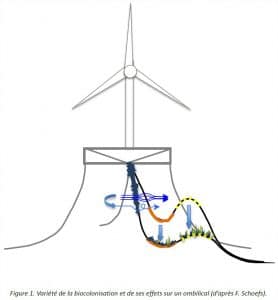Background
Floating Wind Turbine is one of the most promising technologies in view to reach the objectives in emission reduction. One of the key components is the umbilical whose function is exporting the energy from sea to shore.
In this context the BIODYTHERM project funded under the WEAMEC Research call in 2020 adresses the effect on heat transfer from biofouling on dynamic cables.
Scientific advances and innovation
Among all the challenges, marine growth has been identified, from sensitivity studies, as one of the most influent factor at design and maintenance stages. Marine growth embraces all the marine species that colonizes a component. That will change the diameter, the mass, the thermal behaviour and the roughness of the colonized components.
Among the dominant effects, we can notice:
- change in wave current hydrodynamic loading ;
- change in heat transfer from the core to the surface.Due to the high number of uncertainties in space (spatial distribution, type of species) and time (evolution with time), this is a challenge to model this effect.

The first objective of BIODYTHERM project is coupled with the France Energies Marines project OMDYN2 by working on real colonization by mussels that are the dominant species found on structures in Atlantic coasts.
The Biodytherm project therefore aims, in addition to OMDYN2 mentioned above, to:
- the design of carrying out tests on instrumented and artificially colonized tubes;
- the immersion, at the UN-SEA-SMS Biocolmar station, of uncoated aluminum tubes and of coated aluminum tubes with the outer isolating layer of umbilicals.
Expected technical and economic impact
The project aims to qualify and quantify the impact of biofouling on the thermal of the dynamic cable in order to better take these effects into account in the cable design.
Key project milestones
- September 2019Kick-off - Start of the project
- April 2021 - End of the project
Results
Thermal characterization – Steady state
- Effective thermal conductivity of mussels depends on the age mussels (Juvenile, mix or adult) which has different percentage of water porosity.

- Effective thermal conductivity of mussels is higher than the water thermal conductivity due to internal convection in the water porous media of mussels.
- Convective resistance is small comparing to the conductive resistance.
Tracking biofouling growth – Transient
Publications and papers published
Article:
- Ziad MAKSASSI, Bertrand GARNIER, Ahmed OULD EL MOCTAR, Franck SCHOEFS, Thermal characterization of biofouling around a dynamic submarine electrical cable, 29e congrès annuel de la Société Française de Thermique, Belfort sur le thème “THERMIQUE et MIX ENERGETIQUE”, 1 au 4 juin 2021







